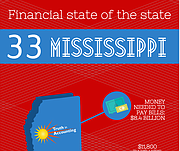Laura Jackson, executive director of the Department of Finance and Administration, says the state’s Comprehensive Annual Financial Report was late this year because all state agencies switched to a new accounting system. Photo courtesy Dept. of Finance and Administration
Wednesday, September 28, 2016
JACKSON — The State of Mississippi is in an $8.4-billion financial hole, a new report based on the State's Comprehensive Annual Financial Report, or CAFR, shows.
Truth in Accounting analyzes government accounting data from each state to produce annual financial assessments. The group's analysis of Mississippi's CAFR for fiscal-year 2015, shows drastically higher debt than in-state calculations yielded.
This is largely due to what Truth in Accounting counts as debt. Sheila Weinberg, the founder of Truth in Accounting, says pension liability and retiree benefits should be a part of the report and count as a part of the state's overall indebtedness.
The Government Financial Officers Association also has new rules requiring states to report their pension liability on their CAFRs.
Mississippi has $5.4 billion in unfunded pension benefits, Truth in Accounting found. Mississippi's assets add up to over $30 billion, but capital assets—which should pay for roads and land—and restricted assets limit available funds to around $5 billion. If pension benefits were all the debt the State had, Mississippi could afford it, but add in bonds and retiree benefits, and its debt is $13.4 billion.
This means that when pension and retirement benefits are included, each Mississippi taxpayer is left with a debt burden of $11,800 per taxpayer, the Truth in Accounting report shows.
The state counts debt largely based on bond data. Without the pension numbers, the state's net tax-supported debt per capita is $1,747 per taxpayer, the state's 2016 Debt Affordability Study shows.
The Debt Affordability Study, produced by the Mississippi state treasurer's office, shows that the state's general bond debt is around $4.19 billion. The state is set to pay out its bonds through fiscal-year 2037, the report shows.
The state pays millions in debt services each year, and technically, fiscal-year 2018 is supposed to be a "balloon payment" year, meaning the state is supposed to pay more than it has in previous fiscal-years on debt.
"As a reminder, a balloon payment is due in FY 2018; however, the intent of the State Bond Commission at that time is to restructure those bonds and extend the maturity," State Treasurer Lynn Fitch writes in the 2016 study.
Inside the State CAFR
Mississippi's fiscal-year 2015 CAFR shows that its combined net position decreased by $2.15 billion compared to fiscal-year 2014. The report tracks the state's fiscal position over the past 10 years. The State's capital assets increased by half a million dollars as well, largely due to construction and building projects, Truth in Accounting reports.
Mississippi had more tax revenue and spent more on "general government" than at any point in the past 10 fiscal years, as well as more on health and social services than ever before. The report points to rising Medicaid expenditures for the increasing health and social service costs, but the spike in "general government," which rose by 88.2 million, is not explained.
"General government" on the CAFR includes a variety of state agencies including both chambers of the Legislature, the governor's office as well as several boards, commissions and agencies that handle budgetary items.
At 33rd place, Mississippi is not at the bottom of Weinberg's list. She admitted that usually a state's budget is "pretty much a political statement," but said the CAFR report can help lawmakers assess where a state budget is headed.
Changing the Accounting System
Weinberg says the CAFR report can be an integral part of the lawmaking and budget-writing process. She says that, as an accountant, she obviously concentrates on these reports, but thinks lawmakers should, too. She adds that if the CAFR isn't taken into account, it's like making a budget with no hindsight.
"It's like you looking at your budget and saying, 'hey, how much do I have to spend, but I don't have my credit-card statement,'" she said.
The Mississippi Department of Finance and Administration creates and publishes the state's CAFR report in conjunction with the State Auditor's office. In previous years, the report was released at the end of the year or, at the latest, halfway through the legislative session. Fiscal years in Mississippi end June 30.
About the Timing ...
Weinberg said most states file CAFR reports late by the Governmental Accounting Standards Board, which recommends a 180-day filing requirement, while corporate CAFR reports are due within 45 days. In her analysis of fiscal-year 2015 reports, Weinberg said about half of states are not filing theirs within 180 days.
Mississippi usually at least comes close. In past fiscal years, DFA published the report in December or January; in 2014 they published the CAFR Feb. 12.
In the past legislative session, however, lawmakers did not have access to the fiscal-year 2015 CAFR until April 22, when it was published.
By that time, all appropriations bills were already in conference and at the discretion of six lawmakers from each chamber. So why was the report filed so late?
The state's head fiscal officer, Laura Jackson said the report was later than usual this year because the state switched over to a new accounting system. Jackson said the department experienced a few hiccups and roadblocks along the way in implementing the new system, which led to the delay.
Now, however, states can report data to the Department of Finance and Administration and across all state agencies in real time.
"[S]tate agencies are able to search for information in this new system, so it's been very helpful," Jackson said.
State agencies have to report information into the system first in order for Jackson and her team to create the CAFR report in the first place. Email state reporter Arielle Dreher at [email protected] and follow her @arielle_amara on Twitter.




Comments
Use the comment form below to begin a discussion about this content.
Sign in to comment
Or login with:
OpenID